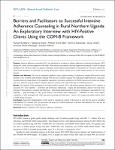Barriers and Facilitators to Successful Intensive Adherence Counseling in Rural Northern Uganda: An Exploratory Interview with HIV-Positive Clients Using the COM-B Framework
Date
2022Author
Beja, Humphrey
Daisy, Nakayiwa
Edek, Micheal Tonny
Kobusinge, Veronic
Akaki, Oscar
Owachgiu, Innocent Ocitti
Udho, Samson
Metadata
Show full item recordAbstract
Purpose: Intensive adherence counseling (IAC) was introduced as a strategy to enhance adherence to antiretroviral therapy (ART)
among HIV clients with non-suppressed viral loads. There has been sub-optimal viral load suppression among HIV clients in Uganda
enrolled in IAC. However, there is a scarcity of literature on the barriers and facilitators of successful IAC. We aim to explore the
barriers and facilitators to successful IAC among HIV-positive clients seeking care in public health facilities in rural northern
Uganda.
Patients and Methods: This was an exploratory qualitative study conducted among 15 purposively sampled HIV-positive clients
enrolled in IAC in public health facilities offering ART services in northern Uganda. We conducted in-depth interviews using semistructured
interview guides based on the capability, opportunity, motivation, and behavior (COM-B) framework for behaviour change.
Data were analyzed using the deductive thematic approach of Braun and Clarke following the COM-B framework.
Results: The majority of the participants were females (60%), married (53%), and attained primary education (47%). Barriers to
successful IAC were Capability – alcoholism and promiscuity, Opportunity – stigma and discrimination, delayed viral load result,
shortage of food, and heavy workload; and Motivation – deteriorating health and lack of incentives. Facilitators to successful IAC were
Capability – good knowledge of ART, good memory, and reminder alerts; Opportunity – availability of ART, social support,
availability of ART, prolonged ART refill, and good counseling; and Motivation – desire to live longer and healthy and the desire
to fulfill dreams and goals.
Conclusion: Successful implementation of IAC needs to consider the context of the person in care thus the need to strengthen
individualized IAC sessions. HIV care providers can adopt the COM-B framework to perform individualized IACs and use the
information to strengthen the counseling sessions
Collections
- Research Articles [13]

